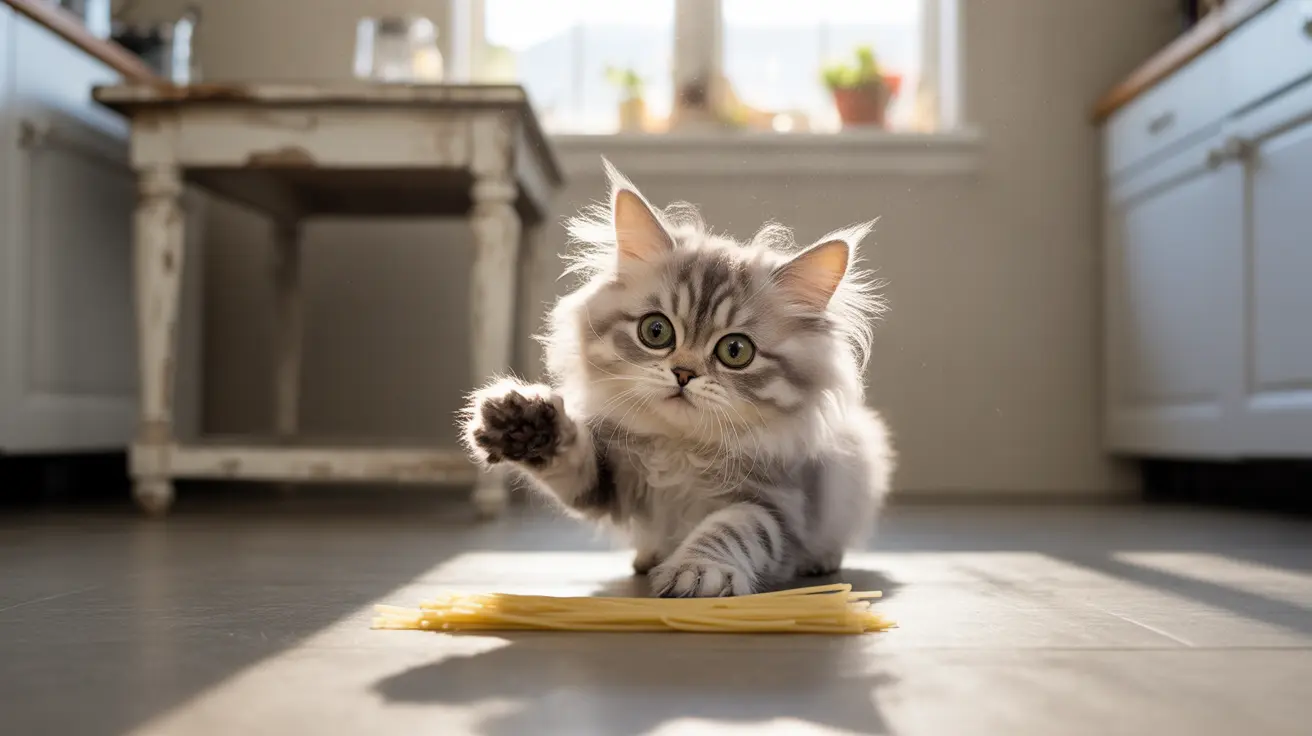If you've ever caught your cat eyeing your plate of pasta, you might wonder: can cats have spaghetti? While plain cooked spaghetti isn't toxic to cats, it's important to understand that pasta offers virtually no nutritional benefits for our feline friends and could potentially cause health issues if fed regularly.
As obligate carnivores, cats require a diet primarily composed of animal protein - not carbohydrate-heavy foods like spaghetti. Let's explore everything you need to know about cats and spaghetti to keep your pet safe and healthy.
Understanding Cats' Nutritional Needs
Cats have evolved to thrive on a meat-based diet rich in protein and essential amino acids. Their digestive systems are specifically designed to process animal tissue, not carbohydrates like those found in pasta. Unlike humans or even dogs, cats lack the necessary enzymes to efficiently digest and utilize large amounts of carbohydrates.
A healthy cat's diet should consist of:
- Over 50% protein from animal sources
- Up to 20% healthy fats
- Less than 3% carbohydrates
- Essential nutrients like taurine and arginine
Safety Guidelines for Feeding Spaghetti to Cats
If you're considering sharing a strand of spaghetti with your cat, follow these important guidelines:
Plain Pasta Only
Only plain, well-cooked spaghetti without any sauce, seasoning, or additives is potentially safe. Never offer pasta with:
- Tomato sauce (potentially acidic and containing harmful ingredients)
- Garlic or onions (toxic to cats)
- Oil or butter (can cause digestive issues)
- Salt or seasonings (harmful to cats in various ways)
Portion Control
If you choose to offer spaghetti, limit it to:
- No more than one or two small strands
- Occasional treats only (not regular feeding)
- Less than 10% of daily caloric intake
Potential Health Risks
Regular consumption of spaghetti can lead to several health issues in cats:
Short-term Risks
- Digestive upset
- Bloating
- Diarrhea or constipation
- Loss of appetite
Long-term Risks
- Obesity
- Diabetes
- Nutritional deficiencies
- Decreased overall health
- Potential organ stress
Better Alternatives to Spaghetti
Instead of offering spaghetti, consider these healthier treats for your cat:
- Small pieces of cooked chicken or turkey
- Tiny portions of cooked fish
- Commercial cat treats formulated for feline nutrition
- Cat grass for safe nibbling
Frequently Asked Questions
Can cats safely eat plain cooked spaghetti, and how much is appropriate?
Cats can safely consume very small amounts of plain, cooked spaghetti occasionally. Limit portions to one or two strands as an occasional treat, never as a regular part of their diet.
Why is spaghetti or pasta not nutritionally beneficial for cats?
Spaghetti is primarily carbohydrates, which cats' bodies aren't designed to process efficiently. Cats require high-protein diets from animal sources, and pasta lacks the essential nutrients they need for optimal health.
What health risks can occur if cats regularly eat pasta or spaghetti with sauce?
Regular consumption of pasta, especially with sauce, can lead to obesity, diabetes, digestive issues, and nutritional deficiencies. Sauces often contain ingredients toxic to cats, such as garlic and onions.
Is it safe to feed cats spaghetti with common ingredients like onions, garlic, or cheese?
No, it's not safe. Onions and garlic are toxic to cats and can cause severe health problems. Even cheese can cause digestive issues as most cats are lactose intolerant.
How should I introduce spaghetti to my cat if I want to treat them occasionally?
If you choose to offer spaghetti, start with a tiny piece of plain, cooked pasta. Monitor your cat for any adverse reactions, and discontinue immediately if you notice any digestive issues or unusual behavior.
Final Thoughts
While cats can technically eat plain spaghetti in very small amounts, there's no nutritional benefit to doing so. Instead, focus on providing your cat with a balanced, species-appropriate diet and treats specifically formulated for feline health. If you want to treat your cat, stick to commercial cat treats or small pieces of cooked meat instead of pasta.






